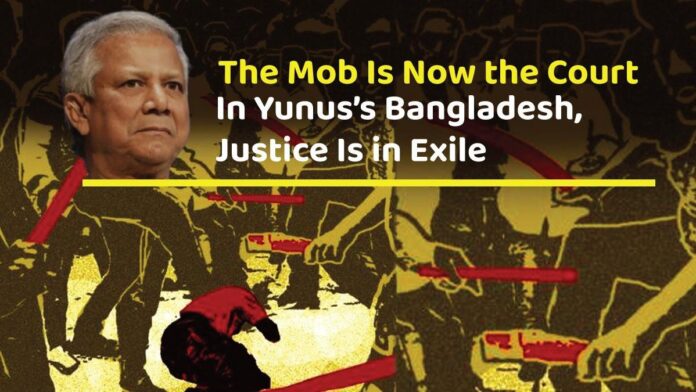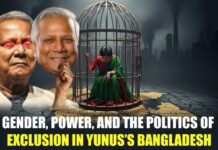There is no law in the country anymore. No justice. No safety.
At every corner stands a disguised mob—violent, organized, and bloodthirsty—posing as angry citizens. They deliver verdicts, issue fatwas, announce punishments, and demand blood. Behind these vigilante squads looms the shadow of Muhammad Yunus and his unelected, unlawful shadow regime.
In a flash, anyone can be branded a “thief,” a “snatcher,” or a “fascist sympathizer”—and lynched. Some plead, “I’m innocent.” Others beg for mercy. Some are silenced with a single kick or punch. But nothing seems to quench the mob’s thirst.
And when police arrive, they come empty-handed—offering only excuses: “No orders from seniors.”
This chaos isn’t random—it’s planned, organized, and state-sponsored. Expecting rule of law from a government that came to power through conspiracy, not the people’s vote, is foolish.
This Yunus clique knows the judiciary is in their pocket, the law enforcement is on their leash, and the mobs? Their street hounds.
And so, in just 9 months, 143 people have died from mob violence.
Our hands don’t even tremble when writing the number—we’ve grown numb to corpses.
We read it in papers, our eyes well up for a moment, and then we scroll on.
And that chilling silence? The government takes it as a license—to kill more, to instill more fear, to unleash more tyranny.
📍 The Vatara Incident – March 4
Two Iranian citizens visiting Bangladesh were caught in a minor currency exchange dispute—nothing criminal. But a whisper of “snatching” spread, and the mob pounced.
They were beaten mercilessly in the street.
The police later confirmed: they were innocent.
Is this Bangladesh’s face now?
Where a passerby’s word replaces courts?
Where justice is meted out with sticks, and trials happen on asphalt?
📍 The Dhanmondi Incident – May 19
A publisher is accused of being a “fascist collaborator.” A group demands entry to his home.
Police arrive and try to calm the situation.
But then, a young man orders the Officer-in-Charge:
“Arrest him. I’ll file the case.”
The O.C. replies:
“There’s no case. Seniors said no arrest without one.”
The boy shoots back:
“Then you’ve taken bribes.”
This is the new order—where mobs give commands, and police stand bowed.
Later, police revealed that members of a so-called “Anti-Discrimination Student Movement” were behind the mob. Some were taken in.
But guess what?
Another mob arrived at the police station to demand their release—with threats and ultimatums.
The mastermind? A student leader, now publicly identified.
These so-called “activists” are no mere protesters—they command mobs, execute political agendas, and settle personal vendettas.
From incident after incident, it’s clear:
These mobs aren’t spontaneous.
They’re trained. They’re protected.
And they operate with government permission.
Expert Speaks
Dr. Tawhidul Haque, criminologist at Dhaka University, says:
“Police hesitate to enforce the law. They’re afraid—who authorized this arrest? Who’ll take the blame?”
And when law enforcement hesitates, criminals get bolder.
Because they know—nothing will happen.
Worse, sometimes the police themselves act for the mob.
This is Bangladesh today:
If you have a personal grudge, you can simply label someone a “thief” and throw them to the mob.
A video goes viral.
No one intervenes.
And the government says, “We’re looking into it.”
But we know what that means:
🔸 “Looking into it” = burying the truth
🔸 “Investigation” = buying time
🔸 “Awareness programs” = distraction and delay
Because the mob has become a branch of the state.




